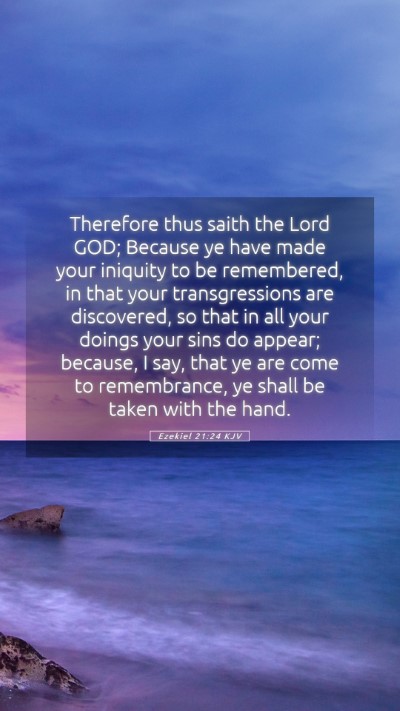Ezekiel 21:24 - Biblical Interpretation and Commentary
Ezekiel 21:24 states, "Therefore thus saith the Lord God; Because ye have made your iniquity to be remembered, in that your transgressions are discovered, so that in all your doings your sins do appear; because I say that ye are come to remembrance, ye shall be taken with the hand." This verse carries profound implications about the nature of sin, accountability, and divine judgment, offering extensive material for Bible verse commentary and understanding.
Meaning and Interpretation
This verse can be understood as a reflection on the persistence of sin and its consequences. Multiple public domain commentaries, such as those by Matthew Henry, Albert Barnes, and Adam Clarke, provide significant insight into its meaning.
-
Matthew Henry's Commentary:
Henry explicates the concept of remembrance in relation to sin. This remembrance is not merely a recalling of past actions but a recognition of the inherent consequences of those actions. Henry emphasizes God's justice in addressing transgressions, reinforcing that acknowledgment of sin is crucial in the process of repentance and redemption.
-
Albert Barnes' Notes:
Barnes focuses on the idea that the people have become aware of their iniquity, which has been laid bare. Through this discovery comes the inevitable outcome of judgment as God revisits their deeds, signifying that the historical and spiritual context of Israel’s actions is vital for understanding divine retribution.
-
Adam Clarke's Commentary:
Clarke notes that God’s pronouncement serves as a warning and beckons a consideration of the state of one’s heart. He underscores that divine judgment is a response to the persistent nature of sin; hence the verse serves as both a reminder and a dire alert of impending consequences.
Exegesis and Scriptural Analysis
In reviewing Ezekiel 21:24, the concept of Biblical exegesis helps to unveil deeper meanings intertwined with the prophet's messages. The specificity of "your iniquity to be remembered" denotes a profound spiritual insight. The acknowledgment of one's sins is not simply an admission; it is an essential step toward true repentance. This calls upon readers to engage in self-reflection, a key aspect of Bible study insights.
Furthermore, understanding the historical context is crucial. Ezekiel was addressing a people in exile, whose disobedience had led to dire consequences. The prophetic voice serves as both a comfort and a warning, making the verse relevant for contemporary readers seeking to understand how biblical principles apply to daily life.
Application in Daily Life
The verse challenges believers to confront their own sinfulness and the need for repentance. It underscores that unconfessed sin leads to further estrangement from God. Engaging with this verse in the context of Bible study groups can foster deep discussions about accountability and spiritual growth.
Applying the lessons of this verse may involve using Bible study tools to explore personal shortcomings and the grace necessary for genuine reconciliation with God. Seeking forgiveness, understanding God's justice, and striving for holiness becomes an actionable takeaway from this passage.
Related Bible Cross References
- Jeremiah 14:7 - Acknowledgment of transgressions and sin.
- Psalm 90:8 - Awareness of iniquities laid before God.
- Romans 2:6 - God’s judgment based on deeds.
- Isaiah 59:12 - The recognition of iniquity and need for repentance.
- Hebrews 4:13 - All things are naked and open before God.
Conclusion
Ezekiel 21:24 serves as a potent reminder of the consequences of sin and the critical requirement for repentance. By utilizing Bible study resources and engaging deeper with the text, one can gain a richer understanding of Scripture. Whether for online Bible study or personal reflection, this verse speaks directly to the heart of human experience and divine response.


